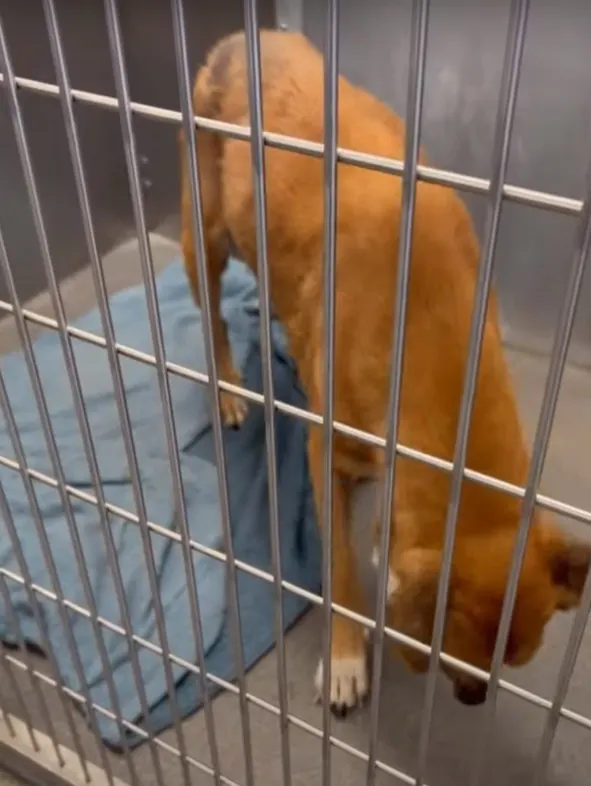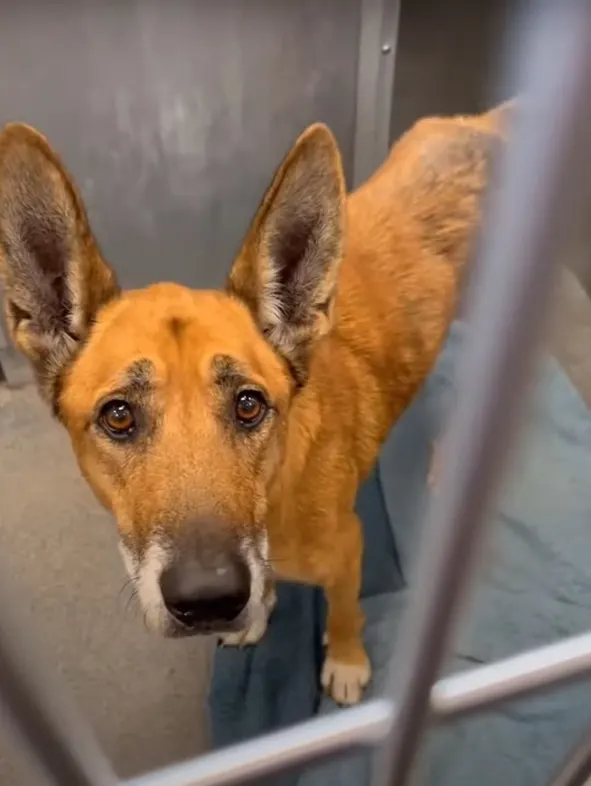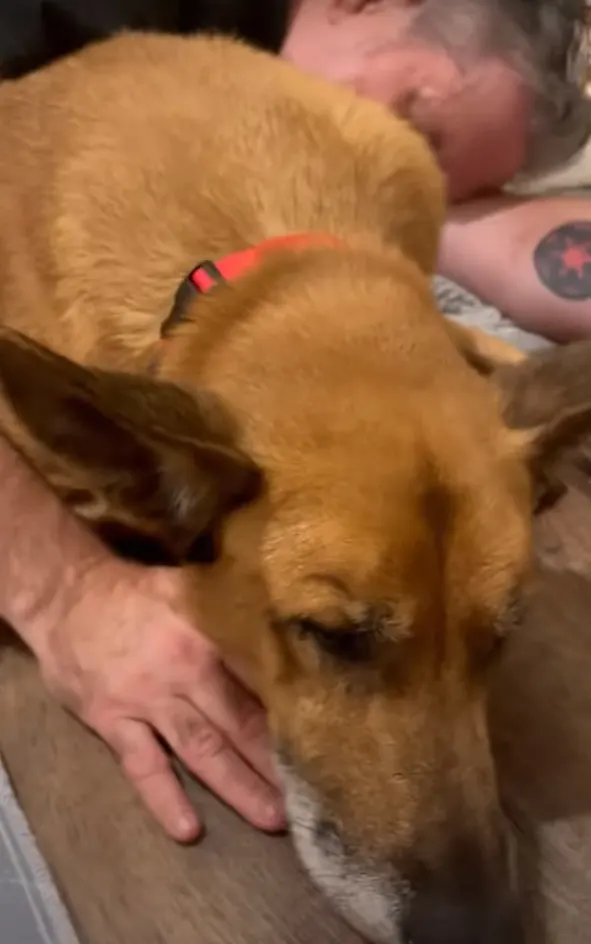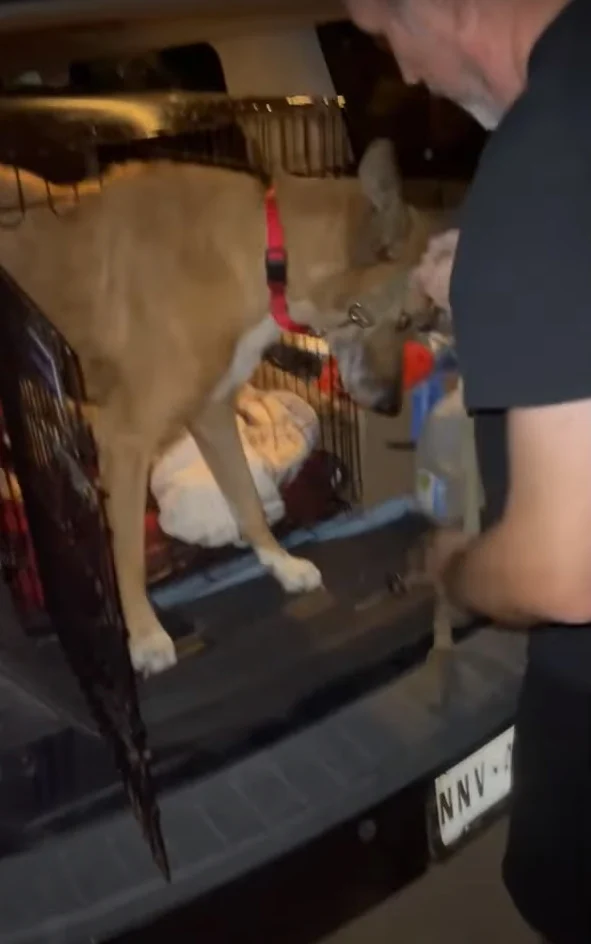As I was reading the story I am about to talk about, something about it was just really sad and depressing.
When dogs get adopted, many of them don’t imagine that their owners would ever leave their side, but when it does happen, it’s just heartbreaking.
What makes it even worse for this story is that the dog’s owners surrendered the pup to the shelter where they first met him.
Buddy Was So Sad

When Buddy was first surrendered to an animal shelter in Texas, it was because his owner had a lot of health problems and couldn’t take care of him anymore.
This devastated him, as he did not understand why this was happening and he couldn’t do anything about it.
However, this was not the end of Buddy’s unfortunate situation. His own health also started to deteriorate and the workers at the shelter wanted to do something to help him.

He had problems walking on his hind legs and he needed somebody who could look after him the whole way through his recovery.
So, the staff had to react fast and find a medical foster for him in Texas, as he was on the euthanization list and didn’t have much time.
That’s when the miracle happened and somebody stepped in to take him in. When his new parents showed up at his kennel, Buddy perked up after seeing treats.
Buddy Is The Sweetest Dog

For a moment, he was happy to see someone who showed some care and compassion for him. Now, all that remained was to take him to a safe place.
His new parents placed him in a car and took him to his new home where he could finally relax a little.
They took him to the vet the following day and they found that he had yeast dermatitis, stiff joints, and sore legs.
Luckily, they were able to give him the necessary medication to help him heal. Now, it was time for him to go back home.

Several days went by and his parents realized just how much happier he was now that he was with them and actually enjoying his life.
One of his favourite activities is lying next to his new dad and taking a long nap. He also enjoys playing with toys often.
Buddy gets excited when it’s his mealtime. His parents noticed that he likes ham a lot, for some reason, which makes eating all the more special for him.
He went from being a sad, abandoned dog to a really happy and healthy one in such a short time. It’s amazing how he made such a recovery, thanks to his parents.
Ever wondered why your furry companion can’t indulge in the sweetness of grapes? As a seasoned dog trainer, you’re well aware of the importance of a canine’s diet. Dogs, with their curious nature, might sniff around for a taste of everything, but when it comes to grapes, caution is key. The mystery behind why dogs and grapes don’t mix is a tale as old as time, and understanding the reasons behind this can help you keep your pet safe and healthy.
You’ve probably heard the grapevine chatter about the potential dangers grapes pose to our four-legged friends. It’s not just a myth or an old wives’ tale; there’s real science behind this canine conundrum. As you navigate the world of pet care, knowing the ins and outs of what foods are off-limits for your dog is crucial. So, let’s dig a little deeper into the forbidden fruit that is grapes and uncover the secrets that make them a risky snack for your beloved pup.
The Dangers of Grapes to Dogs
Toxic Components in Grapes:
Grapes and raisins can be highly toxic to dogs, irrespective of breed or size. Even consuming small amounts can lead to severe health issues. The exact toxic component in grapes that affects dogs is still unidentified. It’s crucial to keep grapes and raisins away from your furry friends to prevent any potential harm.
The Mystery Behind Grape Toxicity:
The reason behind why grapes are toxic to dogs remains unclear. While some dogs may consume grapes without any visible side effects, others may suffer from kidney failure or other complications. Due to this uncertainty, it’s best to err on the side of caution and avoid feeding grapes to your dog altogether.
Symptoms of Grape Toxicity in Dogs
Immediate Symptoms Post-Ingestion
After a dog ingests grapes, you might notice immediate symptoms that indicate grape toxicity. These can include vomiting, diarrhea, lethargy, and abdominal pain. It’s crucial to pay attention to these signs, as they can be the first indicators of a potentially dangerous situation.
Long-Term Health Complications
In the long run, grape toxicity can lead to severe health issues for your furry friend. One of the most concerning complications is kidney failure. This condition can develop within hours to days after grape consumption and may require intensive veterinary care. Other long-term effects can include dehydration, decreased appetite, and potentially fatal consequences if not treated promptly.
Remember, for the safety of your beloved pet, always keep grapes and raisins out of their reach. Immediate veterinary attention is crucial if you suspect your dog has eaten grapes, as timely intervention can save their life.
The Science Behind Grape Toxicity
What Research Says
Research indicates that dogs’ bodies react negatively to grapes and raisins, leading to severe health issues such as kidney failure. This toxic reaction remains consistent across various breeds and sizes of dogs. Despite extensive studies, the specific substance in grapes that causes toxicity in dogs is yet to be identified definitively.
Grape Toxicity Theories
Several theories have been proposed to explain grape toxicity in dogs, but none have been confirmed as the sole cause. One hypothesis suggests that a particular compound present in grapes triggers the toxic response. Another theory revolves around how dogs metabolize certain substances in grapes differently than humans, leading to the harmful effects. While these theories provide insights into grape toxicity, further research is essential to fully understand the mechanism behind this dangerous reaction.
Keeping Your Dog Safe from Grapes
Alternatives to Grapes as Treats
When it comes to treating your furry companion, opt for safe alternatives like blueberries, carrots, or slices of apple. These options are not only delicious but also free from harmful substances that could jeopardize your dog’s health.
Prevention Strategies for Pet Owners
To ensure your pet’s well-being, it’s crucial to store grapes and raisins in secure containers out of your dog’s reach. Additionally, be mindful of foods containing grape products, such as certain jams or baked goods, and keep them away from your curious pup. Remember, prevention is key in safeguarding your dog from potential grape toxicity risks.
What to Do If Your Dog Eats Grapes
First Steps and Home Care
If your dog eats grapes, the first step is to act quickly. Immediately remove any remaining grapes from your dog’s reach. Make sure to stay calm, assess the situation, and contact your veterinarian or an emergency animal hotline for guidance.
When to Seek Veterinary Help
It is crucial to seek veterinary help right away if your dog consumes grapes. Even if your dog shows no immediate symptoms, the ingestion of grapes can be harmful. Contact your vet or an emergency animal clinic for advice on the next steps to ensure your dog’s well-being and prevent any potential complications.
Conclusion
So, now you know why dogs can’t eat grapes. It’s all about keeping your furry friend safe and healthy. Remember, grapes and raisins can be harmful, leading to serious issues like kidney failure. It’s best to stick to dog-friendly treats like blueberries and carrots. And if your dog does happen to munch on some grapes, act fast! Contact your vet or an animal hotline right away. Prevention is key, so keep those grapes out of reach and enjoy worry-free playtime with your pup. Stay informed and keep your pet out of harm’s way.
Frequently Asked Questions
Are grapes and raisins toxic to dogs?
Yes, grapes and raisins are toxic to dogs and can lead to kidney failure, even in small amounts. The exact toxic component is still unknown.
What are the symptoms of grape toxicity in dogs?
Symptoms of grape toxicity in dogs include vomiting, diarrhea, lethargy, loss of appetite, abdominal pain, dehydration, and increased urination. Immediate veterinary care is crucial.
How can pet owners prevent grape toxicity in dogs?
Pet owners can prevent grape toxicity by avoiding feeding grapes or raisins to dogs, opting for safe alternatives like blueberries and carrots. Store grapes securely and keep grape-containing foods out of reach of dogs.
What should I do if my dog eats grapes?
If your dog eats grapes, act quickly by removing any remaining grapes, staying calm, and contacting a veterinarian or emergency animal hotline for guidance. Seek veterinary help even if the dog shows no immediate symptoms.
[no_toc]

Hey there, I’m Janet Brooks, a dog-loving student from California. I’m all about helping pups in need, especially those without homes. Me and my awesome friends work together to give shelter and love to stray dogs. Oh, and I also write blogs about dogs to share helpful info.